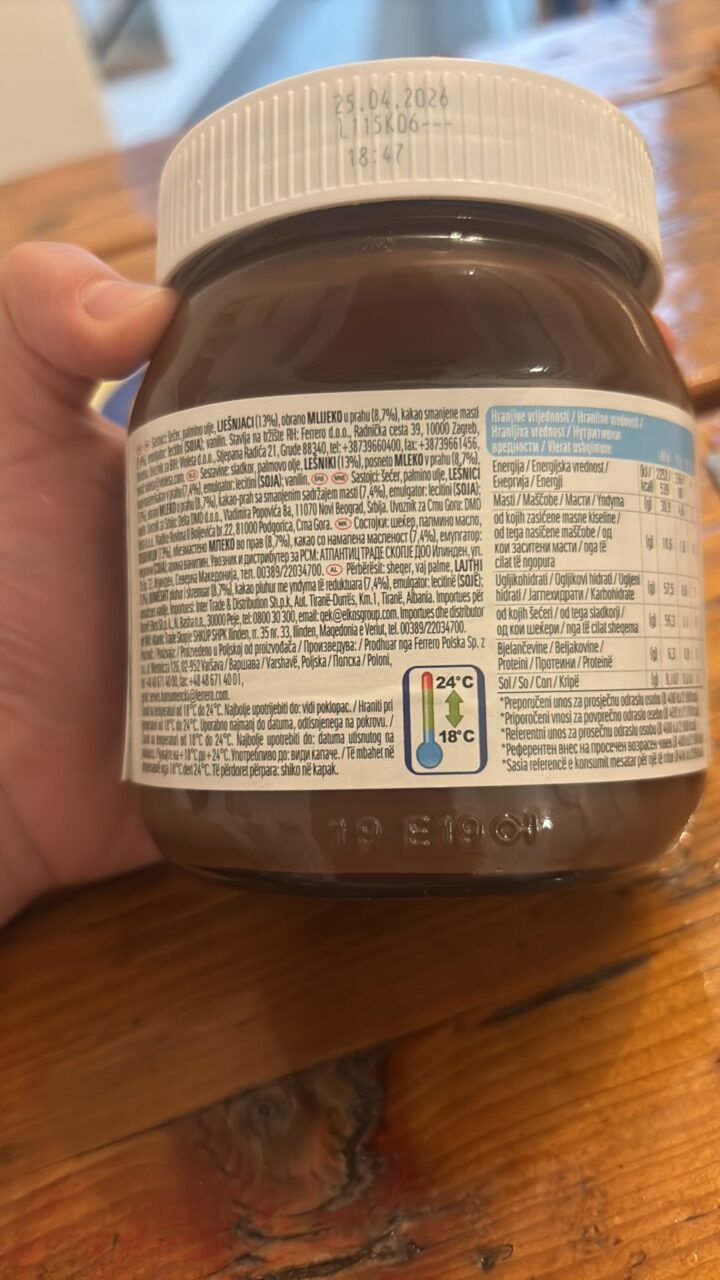
Barcode: 01238705
nutella
HALAL
📝 Reason: Most ingredients in Nutella are naturally Halal (sugar, palm oil, hazelnuts, skimmed milk powder, cocoa, soya, vanillin). However, ’emulsifier’ and ‘lecithins’ are Doubtful because their origins can be plant, animal, or synthetic; when not specified or certified Halal, uncertainty remains. According to Islamic dietary law (Quran 5:3), Muslims must ensure the source is Halal. IFANCA and Halal Food Authority state that ambiguous ingredients without certification should be considered Doubtful.
🏷️ Category: Chocolate Spread, Hazelnut Spread
📄 Certificates: Vegetarisch
Ingredients:
Details
Understanding the Halal Status of Nutella
Nutella is one of the most beloved chocolate spreads worldwide. However, for those adhering to Islamic dietary laws, the question arises: Is Nutella halal? This post delves into Nutella’s Halal status, examining its ingredients and E-numbers, to help you make an informed decision.
What Makes Nutella Halal?
The primary ingredients in Nutella are sugar, palm oil, hazelnuts, skimmed milk powder, cocoa, emulsifiers, lecithins, soya, and vanillin. Most of these components are naturally considered Halal. Let’s break them down:
Ingredient Analysis
- Sugar: Refined sugar is generally Halal unless processed using animal products. Most commercial sugar is plant-based and safe for consumption according to Halal Food Authority.
- Palm Oil: This oil is derived from the fruit of the oil palm and is completely plant-based, making it Halal friendly. More details can be found in this article.
- Hazelnuts: Being a plant-based nut, hazelnuts are universally accepted as Halal. Learn more about nut ingredients at Ehalal.
- Skimmed Milk Powder: Derived from cow’s milk, this component remains Halal as long as it is not contaminated by non-Halal substances, as noted by the Halal Food Authority.
- Cocoa: Cocoa is a plant product obtained from cocoa beans, making it naturally Halal. For further details on cocoa, refer to the Halal Food Authority.
- Emulsifier: The source of this ingredient is ambiguous. It could stem from plant, animal, or synthetic origins. Without explicit certification, its Halal status is dubious. More insights are available here.
- Lecithins: Lecithins might be derived from soya (Halal) or egg yolks (Doubtful without certification). Without a clear statement, its status remains uncertain. Read more about lecithins at IFANCA.
- Soya: A completely plant-based ingredient that is considered Halal, as noted by IFANCA.
- Vanillin: This flavoring is usually synthetically produced and is classified as Halal. For additional details, see IFANCA.
Final Thoughts on Nutella’s Halal Status
While most of the ingredients in Nutella are Halal, the presence of emulsifiers and lecithins raises concerns. Without explicit Halal certification for these components, their status remains Doubtful. According to Islamic dietary laws as cited in the Quran (Quran 5:3), Muslims must ensure that all components sourced are Halal to adhere to their dietary restrictions.
Certification Context
Nutella does not have a specific Halal certification but is labeled as ‘Vegetarisch,’ which often indicates compliance with non-meat ingredients. Nevertheless, due diligence regarding the unverified emulsifiers and lecithins is crucial for those strictly observing Halal dietary laws.
The brand remains popular and beloved across various cultures, but it’s critical for consumers looking for Halal products to seek transparency in ingredients and sources. Always check for updated certifications and be mindful of ambiguous ingredients, especially when consuming imported or processed foods.
